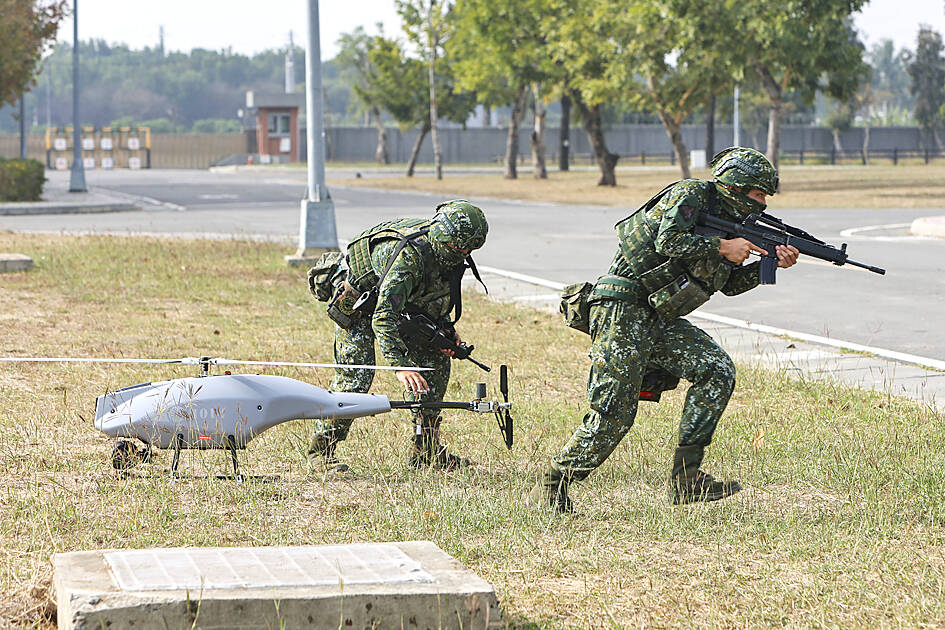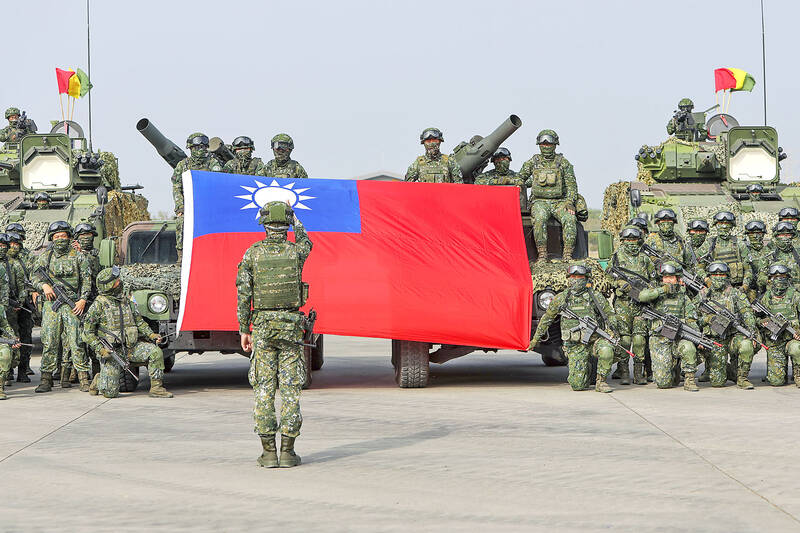The military yesterday unveiled the nation’s indigenous close-range tactical uncrewed aerial vehicle during a battalion exercise in Kaohsiung.
It was the first public appearance of the drone developed by the Chungshan Institute of Science and Technology.
The Third Combined Arms Battalion, 564th Armored Brigade carried out the anti-air assault exercise near an army base in Kaohsiung, with members of the media attending.

Photo: Daniel Ceng, AP
The drones — which resemble miniature helicopters — were utilized by a reconnaissance platoon in the battalion’s mortar company to detect and target enemy positions, the platoon’s second-in-command told a post-exercise news conference.
Real-time visual information provided by the system enables the battalion to engage opposing forces without a direct line of sight, he said, adding that the drones’ ease of use inspires confidence in troops.
Drone operators receive two weeks of training and undergo refresher courses once every two years, he said.

Photo: Daniel Ceng, AP
The 180cm long and 39cm wide drones have a maximum speed of 64kph and a service ceiling of 1,500m, and are capable of flying in Beaufort scale 6 winds, the army said in a statement.
The field exercise pitted the battalion’s armored and mechanized units against an opposing force portrayed by troops landing in Boeing CH-47 Chinook helicopters.
The purpose of the drill was to enhance the battalion’s ability to fight as an independent tactical unit, which requires mastery of command and control, field reconnaissance and surveillance, combined arms tactics, air defense and the use of fires, an army spokesperson said.
This week, the military is staging drills intended to reassure the public of its ability to counter China’s threats ahead of the Lunar New Year holiday.
Separately, the Ministry of National Defense posted a procurement notice to obtain 100AIM-X Block II Sidewinder tactical missiles from the US at a cost of NT$2.4 billion (US$78.86 million), with delivery to be completed by late 2030.
The advanced heat-seeking missiles for Taiwan’s F-16 jets are part of a larger deal signed by a delegation from the armed forces and the American Institute in Taiwan, the de facto US embassy in Taipei, a ministry official said on condition of anonymity.
The transfer of the missiles, four tactical guidance units, spare parts and other related equipment was one of the three arms deals the US Defense Security Cooperation Agency announced in September last year, the official said.

INVESTIGATION: The case is the latest instance of a DPP figure being implicated in an espionage network accused of allegedly leaking information to Chinese intelligence Democratic Progressive Party (DPP) member Ho Jen-chieh (何仁傑) was detained and held incommunicado yesterday on suspicion of spying for China during his tenure as assistant to then-minister of foreign affairs Joseph Wu (吳釗燮). The Taipei District Prosecutors’ Office said Ho was implicated during its investigation into alleged spying activities by former Presidential Office consultant Wu Shang-yu (吳尚雨). Prosecutors said there is reason to believe Ho breached the National Security Act (國家安全法) by leaking classified Ministry of Foreign Affairs information to Chinese intelligence. Following interrogation, prosecutors petitioned the Taipei District Court to detain Ho, citing concerns over potential collusion or tampering of evidence. The

‘FORM OF PROTEST’: The German Institute Taipei said it was ‘shocked’ to see Nazi symbolism used in connection with political aims as it condemned the incident Sung Chien-liang (宋建樑), who led efforts to recall Democratic Progressive Party (DPP) Legislator Lee Kun-cheng (李坤城), was released on bail of NT$80,000 yesterday amid an outcry over a Nazi armband he wore to questioning the night before. Sung arrived at the New Taipei City District Prosecutors’ Office for questioning in a recall petition forgery case on Tuesday night wearing a red armband bearing a swastika, carrying a copy of Adolf Hitler’s Mein Kampf and giving a Nazi salute. Sung left the building at 1:15am without the armband and apparently covering the book with a coat. This is a serious international scandal and Chinese

Seventy percent of middle and elementary schools now conduct English classes entirely in English, the Ministry of Education said, as it encourages schools nationwide to adopt this practice Minister of Education (MOE) Cheng Ying-yao (鄭英耀) is scheduled to present a report on the government’s bilingual education policy to the Legislative Yuan’s Education and Culture Committee today. The report would outline strategies aimed at expanding access to education, reducing regional disparities and improving talent cultivation. Implementation of bilingual education policies has varied across local governments, occasionally drawing public criticism. For example, some schools have required teachers of non-English subjects to pass English proficiency

TRADE: The premier pledged safeguards on ‘Made in Taiwan’ labeling, anti-dumping measures and stricter export controls to strengthen its position in trade talks Products labeled “made in Taiwan” must be genuinely made in Taiwan, Premier Cho Jung-tai (卓榮泰) said yesterday, vowing to enforce strict safeguards against “origin laundering” and initiate anti-dumping investigations to prevent China dumping its products in Taiwan. Cho made the remarks in a discussion session with representatives from industries in Kaohsiung. In response to the US government’s recent announcement of “reciprocal” tariffs on its trading partners, President William Lai (賴清德) and Cho last week began a series of consultations with industry leaders nationwide to gather feedback and address concerns. Taiwanese and US officials held a videoconference on Friday evening to discuss the